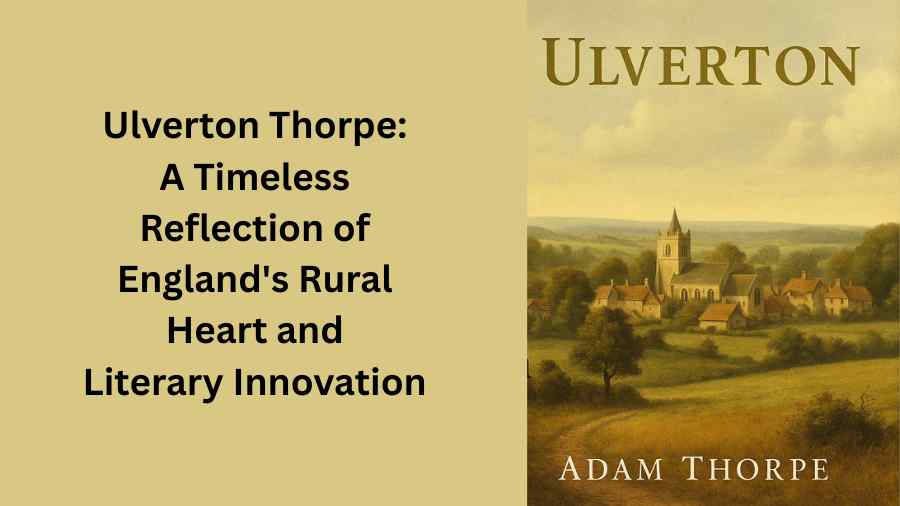Ulverton Thorpe: A Timeless Reflection of England’s Rural Heart and Literary Innovation

Ulverton Thorpe is a name that evokes both mystery and meaning — a fusion of a place and a storyteller. At its heart lies Ulverton, the masterful debut novel by Adam Thorpe, one of Britain’s most gifted yet underrated literary voices. Published in 1992, this novel stands as a deeply layered exploration of England’s rural past, human endurance, and the eternal relationship between people and place. The name Thorpe itself, meaning “village” or “hamlet” in Old Norse, ties beautifully to the novel’s essence — a narrative rooted in land, memory, and identity.
The Genesis of Ulverton Thorpe
When Adam Thorpe published Ulverton in 1992, few could have predicted the impact it would have on modern British literature. The novel, structured as twelve interconnected stories spanning over 300 years, chronicles the evolution of a fictional English village named Ulverton from the seventeenth century to the late twentieth century. Each chapter is written in a completely different voice, mimicking the language, tone, and literary style of its era.
The name “Ulverton Thorpe” therefore reflects two intertwined ideas: the fictional place (Ulverton) and the creative voice (Thorpe). Together, they create a literary landscape that is both local and universal — a small world that mirrors the entire human condition. The book earned critical acclaim and won the Winifred Holtby Memorial Prize, marking Thorpe as a writer of rare intelligence and authenticity.
The Village as a Living Character
In most novels, the protagonist is a person; in Ulverton Thorpe, the protagonist is the village itself. Across centuries, houses crumble, generations pass, and yet the soil, the stones, and the silence of the land remain constant. This continuity gives the reader a haunting sense of belonging and impermanence all at once.
Ulverton is not described as a nostalgic haven of pastoral peace. Instead, it is portrayed with brutal honesty — muddy fields, hard labour, hunger, desire, faith, superstition, and survival. Through these changing landscapes, Thorpe captures the pulse of rural England in its rawest form.
The Power of Voice and Language
One of the most astonishing aspects of Ulverton Thorpe is Thorpe’s command of language. Every chapter feels as if it were written by a different author from that historical period. From the archaic English of the seventeenth century to the clipped modernity of the twentieth, Thorpe’s linguistic precision immerses readers in time itself.
For example, early chapters resemble sermons or diaries written by Puritan settlers. Later ones mimic newspaper reports, soldiers’ letters, or film scripts. This evolution in form mirrors the way society itself transforms — from oral storytelling to the digital age.
Thorpe’s genius lies in how he lets language become a time machine. Each shift in tone, vocabulary, and rhythm makes the reader feel transported, not through imagination alone but through linguistic reality. This makes Ulverton Thorpe not just a story, but an experience of time.
The Themes That Shape Ulverton Thorpe
The novel explores multiple layers of human experience — faith, loss, love, class struggle, war, and memory. Yet, beneath all these lies a deeper question: What does it mean to belong to a place?
1. Memory and Continuity:
The novel shows how human stories fade, but traces remain in the soil, in objects, and in the silence of fields. A plough, a house, or even a boundary wall becomes a silent witness to generations gone by.
2. Transformation and Loss:
As centuries unfold, Ulverton witnesses revolutions, industrialisation, modernisation, and urban drift. The beauty of nature collides with the march of progress. Through these contrasts, Thorpe captures the bittersweet truth of human advancement — that every gain comes with a quiet loss.
3. Identity and Class:
In Ulverton Thorpe, every voice belongs to someone from a different social class — from peasants and soldiers to landowners and filmmakers. This variety gives a panoramic view of English history, showing how the same land can cradle both privilege and poverty.
4. Nature and Humanity:
The novel is filled with imagery of trees, rivers, seasons, and the eternal rhythm of nature. Yet, it also reveals how humanity constantly tries to shape and control the natural world. The result is a delicate balance between harmony and destruction.
Adam Thorpe: The Voice Behind Ulverton
Adam Thorpe, born in Paris in 1956 and educated at Oxford, spent much of his life exploring the intersections between history, memory, and language. Ulverton was his debut, and it immediately positioned him as one of Britain’s most original literary craftsmen.
Thorpe’s writing style combines poetic sensitivity with historical precision. He doesn’t simply describe an era — he resurrects it. His deep understanding of English rural culture, dialects, and idioms allows him to create voices that sound authentically of their time.
Even though Ulverton received high praise from critics such as Hilary Mantel and The Guardian, Thorpe never chased mainstream fame. He preferred to write on his own terms, producing novels, poetry, and short stories that consistently explore the passage of time and the endurance of place.
The Structure: A Literary Time Capsule
Each of Ulverton Thorpe’s twelve chapters is set in a distinct period — from 1650 to 1988 — and written in a unique form. One chapter might be a farmer’s confession, another a widow’s letter, and another a film director’s shooting notes.
This mosaic structure mirrors the archaeological layers of a real English village. Just as an archaeologist unearths fragments of pottery or bone, readers uncover fragments of lives and stories. Thorpe trusts his audience to connect these fragments, to feel the continuity beneath apparent disconnection.
This fragmented storytelling style later influenced several British novelists who explored similar experimental formats. For many readers and critics, Ulverton Thorpe represents a turning point in how modern fiction can treat history — not as a linear record, but as a living, breathing echo.
Why Ulverton Thorpe Still Matters Today
More than thirty years since its release, Ulverton Thorpe remains relevant because it captures timeless truths. In an age dominated by fast information and fleeting attention, Thorpe’s novel reminds us of depth, patience, and belonging.
1. Connection to Roots:
In a modern world where people often move from city to city, Ulverton Thorpe asks us to remember the importance of place. It shows how identity is tied to soil, family, and shared memory.
2. Environmental Reflection:
The novel predates today’s environmental debates but resonates strongly with them. It portrays the slow erosion of land, the changes in weather, and the intrusion of industry — all of which mirror today’s climate concerns.
3. Artistic Experimentation:
In an era where literature often chases commercial simplicity, Ulverton Thorpe celebrates complexity. Its layered voices and shifting styles prove that storytelling can be both challenging and profoundly rewarding.
Reader’s Emotional Journey
Reading Ulverton Thorpe is like walking through a museum where each room speaks a different language, yet tells one grand story. You begin with curiosity, wander with confusion, and end with awe.
Every voice — whether it’s a farmer’s lament or a filmmaker’s reflection — feels intimate and real. By the end, readers feel as if they have lived in the village themselves, shared its seasons, and carried its burdens. That emotional connection is what makes Thorpe’s work unforgettable.
Critical Acclaim and Legacy
Upon its release, Ulverton was widely praised for its ambition and authenticity. Critics called it “a masterpiece of historical ventriloquism” and “a meditation on the endurance of memory.” Hilary Mantel described it as a novel where “you forget you’re reading fiction — you feel you’re hearing the dead.”
Its influence spread quietly but deeply through literary circles. Writers admired how Thorpe revived the English rural tradition without sentimentality. Universities added it to reading lists on postmodern and historical fiction. Today, Ulverton Thorpe stands as a landmark in modern British literature — a novel that redefined how history can be told.
Lessons from Ulverton Thorpe for Writers
For anyone who writes — whether fiction, essays, or blogs — Ulverton Thorpe offers invaluable lessons:
- Voice matters as much as plot. Every era has its rhythm; finding that rhythm brings authenticity.
- Places have memory. Write as if landscapes breathe and remember.
- Complexity rewards patience. True storytelling doesn’t rush; it unfolds naturally, like time itself.
- Emotion outlives detail. Facts fade, but the feeling of a moment endures.
The Enduring Spirit of the Village
By the novel’s close, Ulverton — the village — still stands. Its people have changed, its traditions evolved, yet its spirit survives. This survival is the ultimate message of Ulverton Thorpe: that life, despite all its losses, continues in cycles of renewal.
The past is never dead; it is simply buried beneath our feet, waiting to be heard again. Thorpe’s novel gives those forgotten voices a chance to speak — and in doing so, keeps the essence of English life alive.
Conclusion
Ulverton Thorpe is more than a novel; it is an act of remembrance, a literary monument to time, land, and language. Through his intricate storytelling, Adam Thorpe created a world where every whisper, every field, and every silence holds centuries of meaning.
For readers, it offers an immersive journey through English history, art, and emotion. For writers, it stands as a masterclass in voice, structure, and authenticity. And for anyone seeking a connection to roots in a rapidly changing world, Ulverton Thorpe serves as a timeless reminder that the stories of our places are, ultimately, the stories of ourselves.



